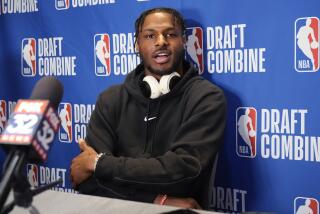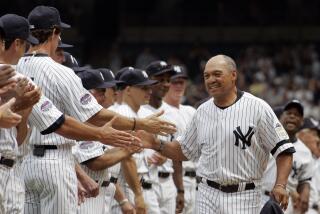COMMENTARY : We’ll Never Know What Bo Would Have Been
Buck O’Neil, the old scout who had seen them all, knew he’d never seen anything like Bo Jackson. Or heard anything like Bo Jackson.
Actually, it was the sound that got the scout first, yanked him out of his office in Kansas City, made him run down to batting practice to see who that was. “I hadn’t heard that sound since Babe Ruth or Josh Gibson. Who is that?” O’Neil was recalling. “I saw him. Gawdamm!”
What we have now is the fascination of fiction and the mystery of legend. We’ll never know what Bo would have been; we know only that he could have been anything. The brilliance of those Nike television commercials inflated man to myth even before his time, but didn’t spoil the imagination. They’re testimony to our time when image is more real than reality.
We have Buck O’Neil, then 78 in the spring of 1991, nearly 60 years in baseball, becoming poetic, dreaming things that bring old scouts to tears of joy. “If he sticks with it,” he said last March, “he’s going to show us something we’ve never seen before -- and I’ve seen Babe Ruth and Josh Gibson. Somebody that big and that fast, I’ve never seen it.
“Let me tell you something: To look at an extraordinary athlete, ain’t nothing better. I’m going to compare it to sex, to a beautiful woman, to music -- the young Louis Armstrong, or Stravinsky. Being with a woman you want to be with. Or a woman that I would think is too good for me.”
Bo Jackson was the forbidden dream.
Now we’ll have to play him against the mysteries of the past. Pete Reiser. My father used to tell me I should have seen him. Fathers tell children they should have seen Mickey Mantle before his skyrocket burned out.
Reiser broke his ankle on the bases, lost the battle of his uncompromising head against the unyielding concrete of outfield walls. Mantle stepped in a drain as a rookie, suffered from a childhood bone disease and adult dissipation of his knees. All mortal afflictions.
Bo’s body was destroyed because he was an outstanding pro football player. The man was -- if in only one fleeting instance -- an All-Star in both sports.
Bo will have an artificial joint replace the degenerating hip he injured doing things that made football scouts sigh. He’s 29. Perhaps he will be able to walk comfortably, play golf, maybe ski and play social tennis. We’ll never see what Buck O’Neil visualized.
One of the things we should notice in the process is just how difficult baseball is for even the most gifted. Bo Jackson played five seasons and part of a sixth in the big leagues. He never led a league in anything except 172 strikeouts in 1989.
He never did anything better than everybody else. He had yet to learn baseball. He was so raw he didn’t know how to go about learning it. There’s more evidence to say he never would have than there is to say it was happening.
Who’s to say he could have been great in either game if he had chosen one? Who’s to say he should have chosen? Certainly not him. The body and the talent belonged to him.
I was in Memphis, Tenn., on June 30, 1986, when the Kansas City Royals showed him off to the world, this Heisman Trophy football player they had convinced to try baseball. I remember the heat in Memphis that day was awful. I remember the Royals organization spoke of him in terms of the composite -- of Willie Wilson’s speed, Mantle’s power, Clemente’s arm -- as if he were so swift he could outrun the wind, so strong he could hold himself out at arm’s length.
He was 6-foot-1, 220 pounds, had a 19 1/2-inch neck and a 33-inch waist. The Royals’ trainer said he was “twice as strong as anybody in the history of the organization.”
Art Stewart, the Royals’ director of scouting, said, “He is the finest athlete and baseball prospect of our time.”
And I rushed to a concession stand to buy a silver-on-blue Memphis Chicks T-shirt for posterity.
He spoke of himself as “Bo,” in the third person, in the contrivance of self-importance. Skeptics doubted his sincerity, thought he was in baseball only as leverage against football. They were too skeptical.
Bo wanted to play baseball. He wanted to play football, too. Some baseball teammates were turned off because he was thinking of football while mere mortals were involved in a pennant race. Some were turned off because he had played so little baseball, he didn’t know how to work on his weaknesses. He didn’t know the nuance of throwing to the right base to keep the double play in order, of hitting behind the runner.
He developed some charm, too. He told of the only time he was ejected from an athletic event. He was in junior high, wrestling heavyweight for the varsity. “Every time I got on this one guy, he’d pinch me,” Bo said. “So I slammed him.”
He kidded himself about skating in the TV commercial, but it was kidding on the square, too. “I know how to skate,” he said. He had rollerblades and used to push the baby in the stroller on skates, twice around the block.
He liked baseball. “In football everybody is tight, wants to rip your head off,” he said. “They’re out for blood. If you don’t get your uniform bloody and dirty, you haven’t played hard enough. Here, baseball is relaxed; you can play hard and come out with a clean uniform. You have to go with the flow. It’s like a smoothly running creek and a raging river.”
Interesting man, fascinating man. “Someday he’s going to learn baseball and something special is going to happen,” veteran catcher Bob Boone said.
It never happened. The New York Yankees’ decision, based on team doctor Stu Hershon’s judgment, was well-founded. That hip couldn’t bear up to that muscle structure.
He made some stupendous throws, hit some thunderbolts. On baseball’s scale of 8, in which the big-league average is 5, O’Neil rated Bo 8. In arm strength he was 8. Speed was 8. “In hitting, one day he’s going to be a 6,” O’Neil said. George Brett was 7.
“He excites you,” O’Neil said. “It’s just what you’re looking for. Whoever I saw, I always figured I was going to see one better -- with more potential. He’s got more.
“It’s hard to explain Bo. He has the potential to be the best player we ever looked at. Will he ever reach it? I don’t know. I’m glad we got him here to see.”
He never reached it. And that’s too bad. But then, that’s good, too. The dream should always surpass the realization. And someday another one will come along and a scout will say, “Greatest potential since Bo.”
More to Read
Go beyond the scoreboard
Get the latest on L.A.'s teams in the daily Sports Report newsletter.
You may occasionally receive promotional content from the Los Angeles Times.










